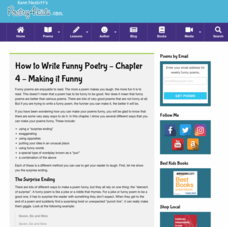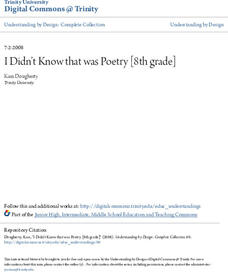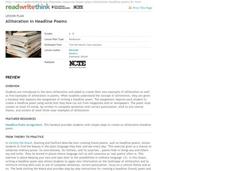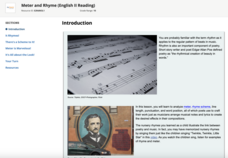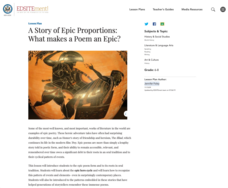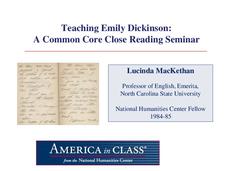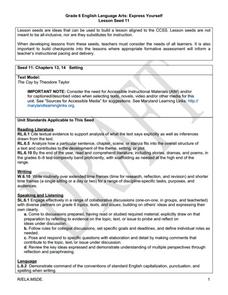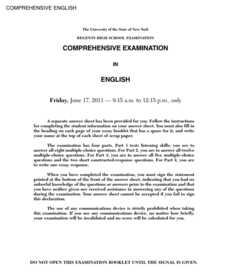MENSA Education & Research Foundation
Magical Musical Tour: Using Lyrics to Teach Literary Elements
Language arts learners don't need a lecture about poetry; they listen to poetry every day on the radio! Apply skills from literary analysis to famous songs and beautiful lyrics with a lesson plan about literary devices. As class...
Poetry4kids
Simile and Metaphor Lesson Plan
Similes and metaphors are the focus of a poetry lesson complete with two exercises. Scholars read poetry excerpts, underline comparative phrases, then identify whether it contains a simile or metaphor. They then write five similes and...
Curated OER
Poetic Elements Are Fun!
Engage your class in the elements of poetry with a series of lessons and activities. The plans cover simile, metaphor, personification, onomatopoeia, alliteration, and imagery. Learners come up their their own metaphors, identify poetic...
Core Knowledge Foundation
Sixth Grade Poetry
Study some of the most prominent poets and works of poetry in history with a language arts poetry unit. From Virgil to Shakespeare to Dickinson to Angelou, the resources present biographies and examples of poetic elements to the sixth...
Poetry4kids
How to Write Funny Poetry — Chapter 4: Making It Funny
You've got your topic—now how do you make your poem funny? Explore ways to make a poem humorous, including puns, exaggeration, silly words, and surprising endings, with a helpful poetry lesson.
Rainforest Alliance
Knowing the Essential Elements of a Habitat
To gain insight into the many different types of habitats, individuals must first get to know their own. Here, scholars explore their school environment, draw a map, compare and contrast their surroundings to larger ones. They then write...
Trinity University
I Didn’t Know that was Poetry
Poetry or prose? That is the question facing middle schoolers as they begin a month-long poetry unit by examining the characteristics that differentiate poetry and prose writing. Pupils learn about poetic devices and different types of...
ReadWriteThink
Alliteration in Headline Poems
Poetry is everywhere you look! Create found poems using headlines from newspapers and magazines. Young poetry focus on creating alliterative phrases with words they find in headlines, tying their poems to a central theme.
Curated OER
Express Yourself Lesson Seed 12: Story Event
Focus on plot and the impact-specific events in The Cay. Class members use their double-entry journals, created in a previous lesson in this series, to record their thinking about the guiding question as they read chapters 15 through 17....
EngageNY
Grade 9 ELA Module 2: Unit 1, Lesson 9
Continue analyzing literature using textual evidence with a lesson on "I Felt A Funeral, in my Brain" by Emily Dickinson. Ninth graders bring their annotation skills and knowledge of figurative language from the previous eight sessions...
Poetry4kids
How to Write an Alliteration Poem
Learners follow five steps to compose an alliteration poem. They choose one consonant and brainstorm as many nouns, verbs, and adjectives they can think of to create rhyming sentences that come together in a poetic fashion.
Academy of American Poets
Women in Poetry
Imagine linking poetry to technology! Thirty-three lessons comprise a 6-week "Women in Poetry" unit for high schoolers. Class members research women poets, learn how to respond electronically to discussions, write their poems, create web...
Office of Migrant Education
Poetry: Form, Syllables, Mood, and Tone
Looking for a resource to introduce homeschoolers and other out-of-class learners to the elements of poetry? Check out this packet that defines and illustrates important poetry terms.
National Endowment for the Humanities
Lu Shih — The Couplets of T’ang
Writing poetry in ancient China was the modern equivalent of sending a greeting card. Scholars learn about the ancient Chinese poetic form called the lu shih. They read about the context of poetry during the T'ang Dynasty and complete a...
Texas Education Agency (TEA)
Meter and Rhyme (English II Reading)
Imagine an interactive that teaches young poets all the essential elements of poetry. This colorful resource does just that. Players are introduced to rhythm, meter, and rhyme schemes using famous poems. They practice marking the...
National Endowment for the Humanities
A Story of Epic Proportions: What Makes a Poem an Epic?
Learners analyze the epic poem form and its roots in oral tradition. In this epic poetry lesson, students research the epic hero cycle and recognize the pattern of events and elements. Learners analyze the patterns embedded in the stories.
National Humanities Center
Teaching Emily Dickinson: A Common Core Close Reading Seminar
Three of Emily Dickinson's poems, "I like to see it," "Because I could not stop for Death," and "We grow accustomed to the Dark," provide instructors with an opportunity to model for class members how to use close reading strategies to...
Curated OER
Express Yourself Lesson Seed 11: Setting
Encourage your learners to examine the setting in Theodore Taylor's The Cay. Pupils work in small groups to put together a description of the setting before reading two more chapters of the book. They use their double-entry journals to...
Scholastic
Defining Conflict Using "The Interlopers"
Feeling conflicted? Work out those issues with a language arts lesson on internal and external conflict. Using "The Interlopers" by Saki, class members identify the conflicts between the characters before writing their own short stories...
Loudoun County Public Schools
Figurative Language Packet
A definitive resource for your figurative language unit includes several worksheets and activities to reinforce writing skills. It addresses poetic elements such as simile and metaphor, personification, hyperbole, and idioms, and...
Gottlieb
Kennings vs. Stock Epithets – A Quick Review
Bone-crusher. Troll-wife. Battle-sweat. Blood-worm. What study of Beowulf would be complete without offering readers of this Old English epic poem an opportunity to craft their own kennings and epithets? Provide individuals with a copy...
New York State Education Department
Comprehensive English Examination: June 2011
Get those pencils sharpened—it's time to see what the class knows! Using the resource, scholars complete a four-part English examination. They read passages and respond to multiple-choice comprehension questions. They also complete two...
National Endowment for the Humanities
Charles Baudelaire: Poète Maudit (The Cursed Poet)
After learning the main ideas of the Decadent movement, students work in small groups to read and translate poems by the French poet Charles Baudelaire using basic etymology skills. They then read the accurate English translations to see...
Museum of Tolerance
Music Evokes Memories and Emotions
Dim the lights, take a deep breath, and press play to explore the emotions and memories that music elicits. Class members begin using relaxation techniques designed to create a positive listening experience. As music plays, learners...






